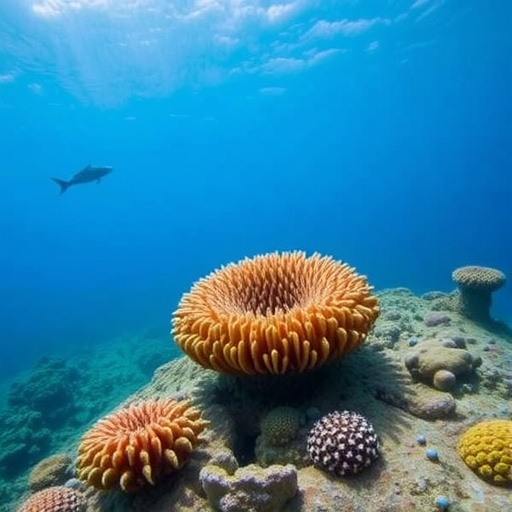Coral reefs, often referred to as the rainforests of the sea, are vital ecosystems that provide shelter, food, and breeding grounds for numerous marine species. However, over the years, these vibrant structures have faced unprecedented challenges due to climate change, pollution, and unsustainable fishing practices. Recent studies have illuminated the potential for coral regeneration, particularly focusing on sun corals within marine protected areas (MPAs). A pivotal new research article highlights the successful regeneration of sun corals following management actions in a Brazilian no-take zone, offering critical insight into coral resilience.
This study, conducted by a team of researchers including Mendes, Coelho-Souza, and de Oliveira, meticulously documents the regeneration patterns of sun coral species over a multi-year period. By examining coral populations within a designated no-take marine protected area, researchers aimed to quantify the effects of protective measures on coral health and resilience. The significance of focusing on no-take areas cannot be overstated; these zones restrict all forms of fishing and resource extraction, allowing marine life to thrive without human interference.
The methodology employed in this research involved a combination of field surveys and monitoring techniques. The researchers collected data on various metrics, including coral density, size distribution, and overall health. By comparing data from protected zones to those of adjacent fished areas, the researchers were able to delineate the positive impacts of no-take management on sun coral populations. This approach provided compelling evidence of the benefits of establishing and maintaining protective marine zones.
One of the key findings of this research was the impressive rate of regeneration observed in sun corals within the no-take area. The researchers noted a significant increase in both the density and health of coral populations over the study period. This regeneration was attributed to the reduced anthropogenic stressors present within the protected area, which allowed corals to recover from previous damage and environmental pressures. As coral reefs are inherently vulnerable to disturbances, the ability of sun corals to regenerate in a safe environment demonstrates their resilience and adaptability.
Moreover, the research shed light on the ecological importance of sun corals, which play a critical role in their ecosystems. As a species that thrives in various marine habitats, sun corals contribute to the structural complexity of reefs, providing essential resources for a myriad of marine life. The findings also highlight the interconnectedness of marine ecosystems, as healthy coral populations contribute to the sustainability and productivity of associated species such as fish and invertebrates.
The implications of this research extend beyond the confines of the studied area. They serve as a vital reminder of the importance of effective marine conservation strategies in the face of ongoing environmental challenges. The results suggest that when properly managed, marine protected areas can facilitate the recovery of coral species, ultimately leading to healthier and more resilient marine ecosystems.
Furthermore, this study underscores the urgent need for continued investment in research and conservation efforts directed at protecting coral reefs worldwide. The data emerging from this research can inform future management strategies, helping policymakers develop targeted actions that promote coral health and biodiversity. As global temperatures rise and human activities increasingly threaten marine environments, establishing and maintaining well-managed MPAs could be among the most effective tools for mitigating coral degradation.
The success of sun coral regeneration in Brazilian no-take marine protected areas lays a foundation for further explorations. As we move forward, it becomes critical to understand the long-term effects of these management actions, not only on coral populations but also on broader marine biodiversity. Investigating the mechanisms underpinning coral resilience could offer valuable insights into how we might preserve these essential ecosystems amidst changing environmental conditions.
This study does not stand alone in the growing field of coral research. Numerous initiatives around the globe are exploring the complexities of coral ecosystems, developing innovative strategies to enhance their recovery and resilience. Sharing knowledge and results across borders will be integral to effectively combatting the multifaceted threats faced by coral reefs and the species that depend on them.
In conclusion, the regeneration of sun corals observed in this Brazilian study encapsulates a beacon of hope for marine conservation efforts worldwide. By spotlighting the impact of no-take marine protected areas, researchers are not only advancing our understanding of coral ecology but also heralding a broader call to action to protect our oceans. The findings serve as a testament to the resilience of nature when afforded the opportunity to recover and remind us of the collective responsibility we share in safeguarding these invaluable ecosystems for future generations.
As we reflect on the insights gleaned from this significant study, it is incumbent upon scientists, conservationists, and citizens alike to advocate for policies that prioritize marine health. The ongoing efforts to study and rehabilitate coral reefs must be amplified, ensuring that initiatives like the one documented in this research become a global standard rather than an exception.
Only through concerted efforts can we hope to secure the future of sun corals and their ecosystems, safeguarding the rich biodiversity that these underwater havens support. The ocean’s future hinges on our ability to embrace sustainable practices and champion the regeneration of vital marine species.
Subject of Research: Regeneration of sun corals in a Brazilian no-take marine protected area.
Article Title: Sun coral regeneration after management actions in a Brazilian no-take marine protected area.
Article References:
Mendes, V.S., Coelho-Souza, S.A., de Oliveira, F.F. et al. Sun coral regeneration after management actions in a Brazilian no-take marine protected area. Coral Reefs 44, 1427–1432 (2025). https://doi.org/10.1007/s00338-025-02674-1
Image Credits: AI Generated
DOI: https://doi.org/10.1007/s00338-025-02674-1
Keywords: Coral reefs, sun corals, marine protected areas, biodiversity, coral regeneration, conservation.




